Final Report for YENC15-089
Project Information
EarthDance set out to educate the 10 members of our 2015 summer Junior Farm Crew about sustainable agriculture through hands-on work carrying out everyday activities of organic farming at EarthDance, as well as through a series of workshops about sustainable ag and the food system, culminating in an overnight field trip to visit an organic research farm and a grassfed beef ranch.
Junior Farm Crew was a paid opportunity for youth in Ferguson, ages 16-20. The program lasted for 10 weeks. Each week began with a two hour workshop designed to introduce the crew to different facets of the Good Food Movement, as well as personal leadership development. Workshop topics were as follows:
- Farm tour and intro to food leadership
- Farm as ecosystem
- Spotlight on the food system, Sustainable Agriculture (view and discuss selections from the film “Food Inc”, pt 1.)
- Spotlight on the food system (view and discuss selections from the film “Food Inc”, pt 2.)
- Public speaking class and practice
- Is Junk Food What We Crave? (view and discuss Real Food Media clip of the same name)
- Writing workshop: storytelling about your JFC experience
- Spotlight on the food system, Hunger and Food Deserts (view and discuss the film “A Place at the Table”)
- Farming as Career (talk and Q+A with Mimo Davis, farmer)
- Growing Healthy Communities (Panel discussion with other local food and eco activists)
- Overnight trip to Busby and Shiregate Farms.
The program was also engineered to build caring community and reinforce positive communication skills among participants. To accomplish this aim, activities learned from other youth farming programs were incorporated. This included:
- Daily check-ins: A first-thing activity to find out how everyone in the group was doing
- Morning energizers: a quick, fun, physical game to boost energy before beginning workshops or farm work
- Daily closing: “Rock, Stick, Leaf.” Each crew member shared what “rocked”; what would “stick” with them; and what they would be “leafing” behind from the day.
- Weekly straight-talk sessions. This technique is borrowed from The Food Project and Grub Farm. Members within a crew give each other feedback in the form of compliments and "deltas": invitations for growth or improvement. The feedback is offered in a compassionate, friendly spirit and received with no expectation of a reply or discussion.
In terms of actual farm work, the crew members received instruction in transplanting and direct seeding, weeding with tools, and harvesting numerous crops. The crew also tended EarthDance’s 60-hen flock of pastured laying birds. JFC members collected eggs, and fed and watered the chickens.
Note: the embedded video was recorded in 2014 and features the 2014 crew.
BACKGROUND
EarthDance’s Junior Farm Crew project originated in EarthDance’s experience hosting Camp EarthDance, a farm-to-table summer camp for middle school students in 2011 and 2012. The camp was a collaboration between EarthDance and the Ferguson-Florissant School District. (In 2012 EarthDance received a SARE Youth Educator grant to operate the camp.) Campers raved about their experiences playing and working on the farm, and learning to cook healthy food back at Ferguson Middle’s home-ec lab. By operating the camp, EarthDance gained confidence in providing farm-based programming for youth. However, both years, it was challenging to recruit the target number of participants. EarthDance staff concluded that our neighborhood needed youth jobs more than a tuition-based camp.
GOALS
- JFC participants will gain knowledge about sustainable agriculture, resulting in positive attitudes about farming and healthy eating.
- JFC participants will also gain transferable skills and job experience that will result in an improved career trajectory.
Output: In 2015, EarthDance Organic Farm School will provide eight youth in-depth education about sustainable agriculture and the food system through a 10-week summer jobs program, the Junior Farm Crew.
EarthDance exceeded this benchmark by employing ten youth for the ten-week program.
PROCESS
Project groundwork was laid in 2013-2014 when EarthDance sought funding from a local foundation to operate a teen jobs program on the farm. This funding paid for stipends for young people, a part-time wage for a Crew Leader, and various supplies. EarthDance operated Junior Farm Crew for the first time in summer 2014. We reached out to contacts in the Ferguson-Florissant School District to spread the word about the opportunity. JFC 2014 was led by James Young, a graduate of EarthDance’s apprenticeship program. Young was also a recently retired middle school teacher with 10 years of experience working with youth. JFC members worked M-F, 8am-12pm, focused on basic farm work. This timeframe provided a few hours of cooler morning temps and meant that shifts concluded before lunch time. After the successful pilot year, EarthDance was eager to plan the 2015 session with more attention to enrichment activities.
EarthDance developed our SARE YE proposal with an outline of workshop topics and a plan to include a capstone experience in the form of an overnight visit to Lincoln University's Busby Research Farm. The structure of weekly workshops was borrowed from EarthDance’s training program for adults, the Farm & Garden Apprenticeship. Our workshop topics were chosen to:
- provide a broad introduction to concerns about our present food system, and possible solutions
or:
- introduce tools that JFC members could use for personal development, including public speaking, writing, cooking, and investigating careers in the food movement.
EarthDance staff designed a mix of hands-on or interactive workshops, along with sessions that would provide a lot of new information in the form of food documentaries. Food Inc and A Place at the Table were chosen as high-quality and impactful films. Two sessions were devoted to Food Inc as it has so much content. All movie sessions included time for discussion. After the season was complete, program staff concluded that Food Inc had been a little too advanced for the teens of the JFC. In 2016, EarthDance will try screening the film Fresh as an introduction to the need for sustainable agriculture.
EarthDance was also able to partner with a local hunger relief agency, Operation Food Search, to provide weekly cooking and nutrition classes to all youth. Dietetics Interns from Fontbonne University assisted with these sessions. Most of the food system workshops and the cooking classes took place at a nearby church.
Mondays were devoted to workshops and cooking class. Tuesday-Friday, JFC members participated in farm work: seeding, transplanting, weeding, harvesting, and tending chickens. They also learned to work with various hand tools. At the start of any new activity, Tiffany Brewer, the JFC Leader, would explain the proper technique, and explain why the activity was important. (Example: weeding with hula hoes. JFC members learned that crops are cultivated to reduce the competition the crops face from the weeds for sunshine, nutrients, and root space. They discussed hand weeding versus the use of herbicides on conventional farms. They also learned efficient and ergonomic means of handling a hula hoe).
The social aspect of the program received significant attention after our SARE Proposal was submitted. Two EarthDance staff members had the opportunity to attend trainings with The Food Project in Boston, and GRuB Farm in Olympia, Washington. Both organizations are focused on agriculture-based youth development. The trainings introduced EarthDance to concepts and practices such as: the four ‘R’s of successful youth programs (Rigor, Relationships, Relevance, and Responsibility); Straight Talk, a method for giving and receiving compassionate feedback; developing ‘Community Contract’ of shared expectations; and team-building games and shared reflection about the games. As a result of what we learned, EarthDance incorporated more time daily and weekly for social activities and reflection. We saw that using these techniques resulted in closer relationships between crew members and generally higher morale during challenging work. EarthDance highly recommends that all educators or program designers hoping to combine youth and farming investigate the training institutes conducted by the organizations mentioned above! Having witnessed these tools in use, EarthDance staff can say that focusing on the social aspect of education is critical. Being in an emotionally safe atmosphere was huge for some of the JFC members, who were accustomed to being bullied in school. People learn with their whole selves: body, mind, emotions. By consciously designing experiences that positively affect all aspects of the self, a curriculum can go deeper than temporary intellectual engagement, it can be transformative.
A final important aspect of the program was the overnight field trip that JFC members attended. The trip centered on a visit to Lincoln University's Alan T. Busby Organic Research Farm. Busby is a 200-acre certified organic farm in Jefferson City, MO. Busby Farm agri-researchers study a vast array of topics relevant to organic production, from compost to cover crops, IPM and intensive grazing, to native plants for food, medicine, and pollinator health.
During their visit to Lincoln University, JFC members were able to learn about milkweed for monarchs, rain gardens, how a community kitchen can benefit a community, that many native plants are edible, what a FINCA is, the difference between beneficial and pest insects, vertical growing and green roofs, and compost tea. EarthDance staff considered it important to plan an outdoor excursion that would not be too much of a shock to the system of our urban-dwelling youth. Busby Farm was an attractive location from this standpoint, as it features facilities specifically geared toward youth development. The have cabins with full bathroom facilities and bunk beds, a kitchen, fire pit, and lounge area. JFC members enjoyed a meal featuring some of the farm produce they had helped to harvest at EarthDance, and relaxed together around a bonfire. This time allowed for reflection on what they had learned at Busby, and on their weeks spent together at EarthDance. The final day of the trip featured a visit to Shire Gate Farm, a grass-fed beef ranch operated by former Rams Football player Will Witherspoon. Witherspoon hosted the group for lunch and a tour, and discussion about why grassfed beef is a healthier and more humane option.
During the van ride home from the trip, Molly Rockamann engaged the JFC in discussion about their take-aways from the trip and their summer working on the farm. They discussed their new awareness of the importance of organic farming and access to healthy food, and the need for food system change. “What would help society to make the changes you would like to see?” asked Rockamann. Some crew members said “more education, more people should work and visit places like EarthDance.” And some said “We need to get political, and get our politicians to listen to us.” This conversation resulted in the EarthDance staff considering the possibility of adding a second day to the 2016 JFC capstone, to allow for a scheduled visit to the capitol in Jefferson City, where the crew could meet representatives and express their wishes for a fair, humane, sustainable food system.
PEOPLE
Molly Rockamann: EarthDance’s Founding Director. 10+ years working to promote organic farming in the US and internationally. Facilitated several focus topic discussions and chaperoned overnight field trip.
Monica Pless: EarthDance Farm Manager, 10 yrs experience commercial and educational farms; former instructor for Boston’s Food Project, a nonprofit youth development organization. Assisted in lessons and farm task instruction for JFC.
Matt Lebon: EarthDance Asst. Farm Manager, 5 years farming internationally, 2 years at EarthDance Farm. Assisted farm task instruction for JFC.
Coach ‘B’ Tiffany Brewer: JFC Crew Leader. A graduate of EarthDance’s Farm & Garden Apprenticeship, provided daily mentorship and training for JFC members.
Fontbonne University Dietetic Interns: several second year graduate students in dietetics led demonstrations and discussions about healthy eating and preparing fresh food.
Gibron Burchette: Urban Farmer, HOSCO. Participated in a panel discussion to share his work with city residents, promoting entrepreneurship and self-reliance through urban agriculture. African-American role model for youth.
Karen Davis: Extension agent and farmer with 20+ years urban and rural farming, knowledgeable about the business of farming. African-American role model for youth. Led discussion about farming as a business.
Dr. Gerardo Camilo: Biology professor, SLU University, studying pollinators at EarthDance.
Christina Popp of Operation Food Search. OFS is an organization devoted to mitigating hunger in St. Louis. Popp led discussion about food deserts and hunger in St. Louis.
Nadia Navarette-Tindale. Professor at Lincoln University, associated with LU’s Busby Farm. Provided extensive tour for JFC.
RESULTS
The youth EarthDance served through the JFC were almost all students in, or graduates of, the Ferguson-Florissant School District. The district is largely African-American and low-income. EarthDance’s 2015 JFC featured significant diversity among its participants. 70% of the crew members were black, 30% were white; one member was the school district’s only National Merit Scholar, and another had entered Junior Farm Crew after participating in a vocational education program at EarthDance for students with learning disabilities. Another crew member’s family was currently facing homelessness during his time participating in the program. Ferguson is a peri-urban area. Though Ferguson youth have access to green spaces (the city has several large parks distributed throughout the area) few are familiar with farming or growing food. EarthDance anticipated that the crew members would be a somewhat self-selecting group, and therefore, more interested in nature and fresh food than a random sampling of Ferguson teens. However, we still projected that the program would increase crew members’ understanding of sustainable agriculture, and induce a sense of responsibility for environmental stewardship.
EarthDance sought to assess the effects of the program through a survey tool called the YARPET (Youth At-Risk Program Evaluation Tool) that was designed to be used by outdoor education programs. It measures the respondent’s self-image in domains such as self-esteem, problem solving, teamwork, and communication.
EarthDance staff adapted the tool to also include domains of Commitment to Food System Change, Awareness of Careers in Health, Agriculture, and Environment, public speaking, and healthy eating. The form asks responders to determine how true or false, on a 1-8 scale, statements such as “As a leader, I get people working well together” and “I know how to grow some of my own food” and “I enjoy sharing my knowledge with others through public speaking” are for the individual. The crew members took this inventory as a pre- and post- program assessement. The compared results showed gains on average for all the domains, with the exception of “Sense of Responsibility” which was unchanged. The most significant average gain was in statements that corresponded with increased awareness of careers in health, agriculture, and environment, and the second biggest gain was in ‘understanding of organic farming techniques and environmental impacts of agricultural practices.’ Generally, the JFC members had self-reported high confidence in their communication, leadership, and teamwork skills; average gains in these domains was modest. The results made EarthDance staff wonder if they should have placed more emphasis on the importance of answering frankly in the pre- and post-survey. However, it is possible that the crew members really did enter the program with high social/emotional self-confidence.
A copy of the summary of our YARPET results is included in the additional media for this report:
EarthDance also solicited open-ended feedback from JFC members. Here is a summary of their responses:
- Would member recommend JFC to a friend
- 8 out of 8 would recommend JFC to a friend
- Most report learning new skills as the deciding factor for this recommendation
- Healthy foods education was a motivating factor for several members
- Most enjoyable aspect of being a member of JFC
- Forming relationships with co-workers & working as a team
- Learning while working
- Learning about nutrition
- Work environment
- Morning exercise
- “Having excellent bosses including Molly”
- Advice for future JFC members
- “Just have fun and be open”
- “If you are willing to work and cooperate with the people you work with, the JFC will be an amazing experience that is worth your summer.”
- “ Keep a positive attitude and to have fun and learn…”
- “It is a good experience and you can really learn about agriculture and where food comes from.”
- Any changes they would suggest for the JFC
- Overall the members felt that there weren’t any changes that they would recommend for the JFC.
2016 DISCUSSION
EarthDance will again operate the Junior Farm Crew program in 2016. We plan to maintain much of the structure of the 2015 program. The positive response of JFC members, and the YARPET results indicate that the components are solid. We will make curriculum tweaks, including fewer film screenings. Two exciting additions to the program will increase the ‘R’ Factor of Responsibility: JFC members will have the opportunity to participate in a Community Food Assessment of Ferguson residents, and instead of simply participating in cooking classes, Operation Food Search will help facilitate a pilot program in which the JFC teens will teach healthy cooking techniques and principles to elementary students. We hope also to be able to extend the overnight field trip to two nights, and include a lobbying visit to the capitol.
The Junior Farm Crew program has significantly increased our feelings of connection to Ferguson. The young people of JFC bring increased diversity and vitality to our community farm. We are also pleased to know that former members of the crew really do recommend the job to their friends, as several of the 2015 members were referred to the program by the 2014 crew, and we have already received inquiries about the 2016 program from relations of the previous year’s participants. One 2014 JFC participant helped his grandmother grow her first food garden, and a 2015 crew member is trying to start a farm at his church. Many JFC participants have said that the program helped them open up to new people and new experiences. EarthDance is confident that the effects of community farming will sprout shoots for these youth for some time to come.
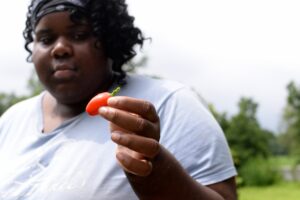
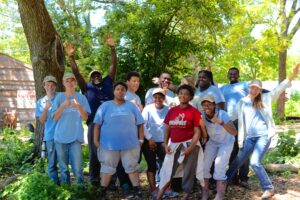
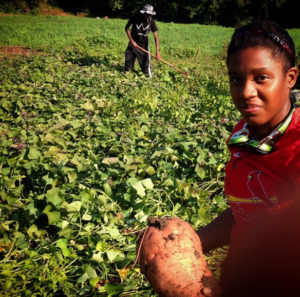
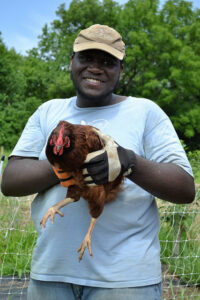
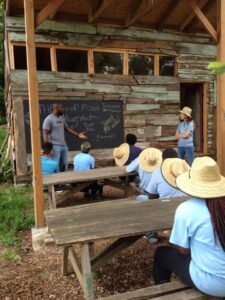
OUTREACH
JFC members received public speaking training, which they practiced by providing tours of the farm for several groups, including younger summer camp visitors and groups of adults. The crew provided tours as a team, with each member taking on a section of the farm (rain garden, permaculture garden, hoop house, etc.) and providing an explanation of the organic agriculture principles in use at their station. During each of the tours, JFC members also explained their role on the farm to visitors. A total of 8 groups (113 individuals) participated in tours that were at least partially led by Junior Farm Crew.